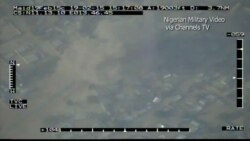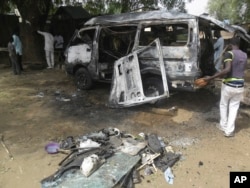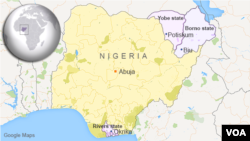Suicide bombers targeted two crowded bus stations in northern Nigeria Tuesday, killing at least 27 people in nearly daily violence in the embattled region.
The first explosion, in the northeastern Nigerian town of Potiskum, killed at least 17 people on Tuesday.
Witnesses said dozens more were wounded in Tuesday morning's blast, which occurred as a man was trying to get on a bus that was preparing to depart for Kano.
Authorities said it was unclear whether the bomber was wearing the explosives or had them hidden in luggage.
Several hours later, two men blew themselves up at a crowded bus park in Kano, northern Nigeria's biggest city, police said.
There was no claim of responsibility for either blast, but both bore the hallmarks of militant group Boko Haram.
It was the second such attack to hit the area this week.
On Sunday, a young girl, described by witnesses as no more than 8 years old, killed herself and five others in Potiskum, the commercial capital of Yobe state. Authorities said at least 19 people were injured in that blast.
Boko Haram has often used young female suicide bombers in the past year. In addition, the Nigerian military said some male terrorists have begun wearing women's clothing to fool security officials.
The attacks are seen as retaliatory strikes by Boko Haram, which has suffered a series of defeats this month in a campaign led by Nigeria and its neighbors, Cameroon, Niger and Chad.
Elections postponed
But the continuing violence recently forced Nigerian President Goodluck Jonathan to postpone the country's presidential and parliamentary elections for six weeks, until March 28.
In an interview published Sunday in the ThisDay newspaper, the Nigerian leader acknowledged he and his government underestimated the strength of Boko Haram.
"Probably at the beginning, we, and I mean myself and the team, we underrated the capacity of Boko Haram," Jonathan said.
He said his military has recently secured more weapons and ammunition to fight Boko Haram. He vowed to soon suppress the insurgents and, "God willing," capture its leader, Abubakar Shekau, before the election.
Boko Haram, which means "Western education is forbidden," has killed thousands of Nigerians in the past five years in attacks on schools, towns, markets, churches, mosques and various government targets.
The violence has also driven about 1.6 million people from their homes.
Boko Haram has expanded its deadly campaign to gain territory for an Islamic state into other countries in the region as well.
Some material for this report came from Reuters and AFP.








